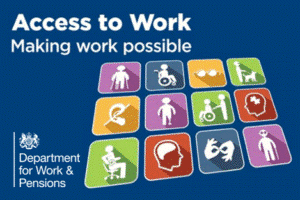Starting a new job
If you have accessed support for your disability or health condition throughout school and university, e.g. in the form of a support plan or funding, you might be concerned about similar support being available to you in the workplace. Larger organisations usually have an equal opportunities/diversity officer, or a member of staff (usually within the Human Resources team) with responsibility for diversity issues who can support you alongside your new line manager in your transition from university to the workplace, as well as your application to the Access to Work scheme (where relevant).
 Access to Work is a scheme that supports disabled people in or seeking work by providing grants to facilitate adjustments, mental health support in the workplace or communication support at job interviews. The video below is an easy-to-understand introduction into Access to Work, including eligibility and the application process. A Disability Employment Adviser (DEA) at your local Jobcentre can also provide further advice.
Access to Work is a scheme that supports disabled people in or seeking work by providing grants to facilitate adjustments, mental health support in the workplace or communication support at job interviews. The video below is an easy-to-understand introduction into Access to Work, including eligibility and the application process. A Disability Employment Adviser (DEA) at your local Jobcentre can also provide further advice.
Access to Work could give you a grant to help pay for things like:
- BSL interpreters, lip speakers or note takers
- adaptations to your vehicle so you can get to work
- taxi fares to work if you cannot use public transport
- a support worker or job coach to help you in your workplace
Mental health support on offer can include a tailored plan to help you get or stay in work, as well as one-to-one sessions with a mental health professional.
Your workplace can include your home if you work from there some or all of the time. It does not matter how much you earn. If you get Access to Work grant, it will not affect any other benefits you get and you will not have to pay it back, although you or your employer may need to pay some costs up front and claim them back later (Source: Access to Work).
You may also be concerned about how your disability will be viewed by your new colleagues. Depending on whether your disability affects you in the workplace, you may choose to share information about your disability with other members of staff or not. You can request that your line manager/Human Resources (HR) keep your condition confidential, but if your disability is visible or if you require support with certain tasks from your colleagues, it may be advisable to tell your colleagues as well. Further help on this process may be available from your HR officer, DEA or the support organisations listed on this website in the ‘sources of employment support and advice’ section.
Many larger employers have a disabled staff network, often supported by their equality, diversity and inclusion officer/team. These groups are a voice for disabled staff in the organisation and aim to provide mutual support and a place to share experiences. Check with your new line manager or your HR officer if your new employer has one. You do not have to join a disabled staff network, but you might find it a useful way to engage with colleagues from across the organisation and might also be able to influence further positive change in your new workplace.


